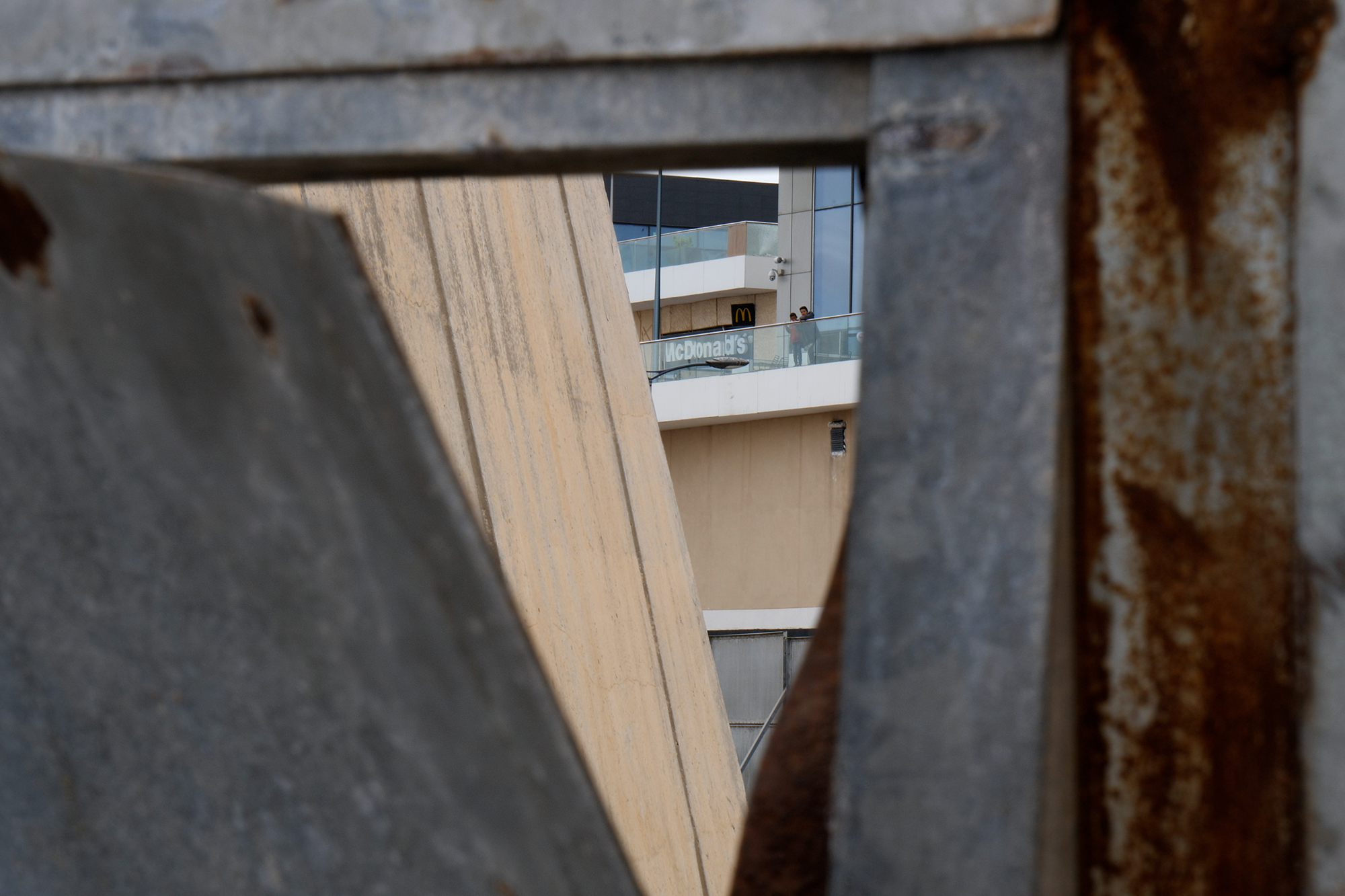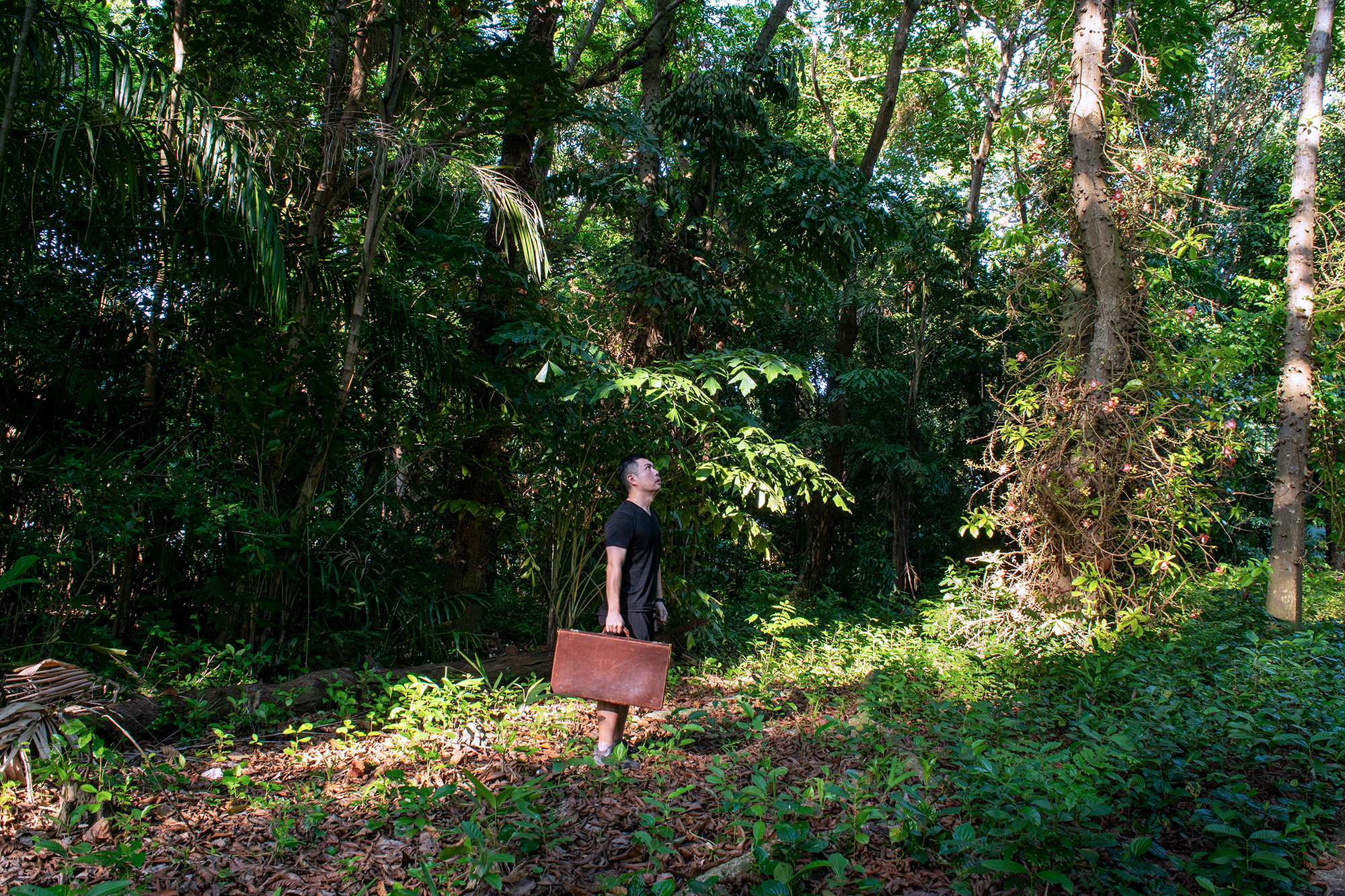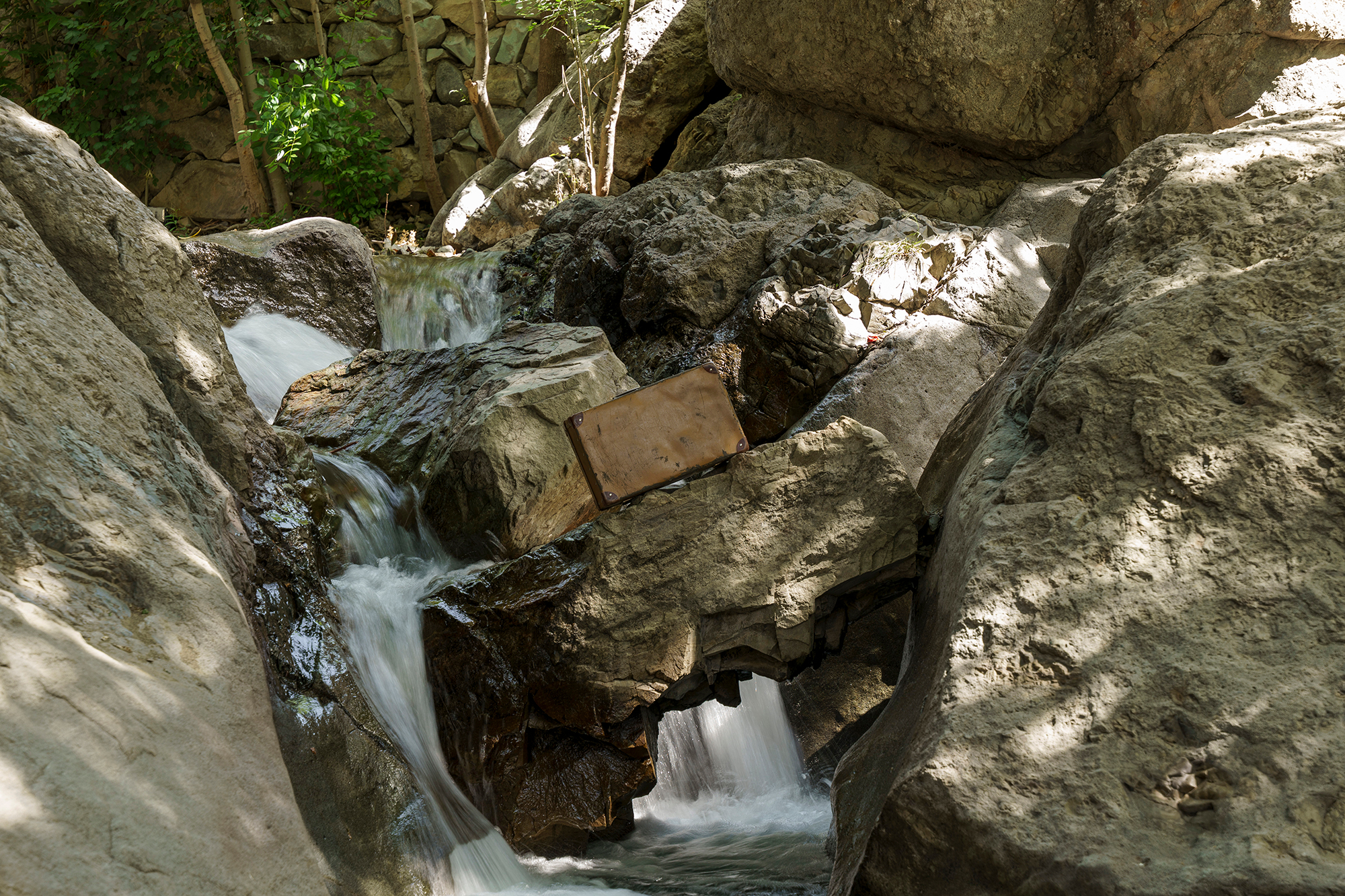Press Release — 10 Min Read
Knock, Knock, Knocking
Press Release — 10 Min Read
Knock, Knock, Knocking
“How can you frighten a [wo]man whose hunger is not only in [her] own cramped stomach but in the wretched bellies of [her] children? You can’t scare [her] — [she] has known a fear beyond every other.”
John Steinbeck
The State as a Treacherous Lover
Supported by the Museum of Contemporary Cuts, the Mediterranean Garden pavilion on the New Sea Waterfront of Thessaloniki has a contemporary art installation, Knock, Knock, Knocking by Lanfranco Aceti, curated by Camilla Boemio. Known internationally for his socio-political stances and performances that have taken places over the past thirty years, the artist has conceived a site-specific installation that engages directly with the theme of the Thessaloniki Biennale, Imagined Homes, and created a public window into the dismantling of contemporary society, its crisis and the consequences on the private home. Through the metaphorical and physical act of ‘airing the dirty laundry,’ the artworks speak of engendered social frameworks, body conflicts, and political individual freedoms which have been dismantled and betrayed.
“I wanted to address this crisis as a breakup between lovers,” explains the artist. “It is the end of the relationship between two people, one of whom embodies the nation-state and the other the collective citizens. It is the aftermath of a quarrel and the lovers have separated. They are both leaving the roof under which they shared dreams, hopes, and cares. The nation-state — embodied in a physical person — is constructed and imagined as a selfish patriarchal, individualistic, and immature man. The people — conceived as one single feminine body — are imagined as a woman with matriarchal values of community, self-sacrifice, and support.”
In the imagined narrative of the artist, the lovers are parting ways. The artworks contain a frozen moment in which objects — once expressed as tangible metaphors of partnership and living in the home — are now being divided and discarded. What is left of this relationship is on public display in the Mediterranean Garden pavilion within which Aceti, by engaging with the architectural elements, creates reflections of visible and invisible spaces tracing the lines between private, semi-private, semi-public, and public engagements. The remainders of the relationship are the artworks made of discarded sheets which bare the traces of the bodies and the now forgotten relationship. These are objects that are disposed of, thrown out from the window of a private home onto the street. The dirty sheets, soiled with bodily fluids, are not only a record of a past relationship but also simulacra of a social and political collapse of wider relationships in the Mediterranean. The sheets and the writings upon them offer — in contradictory terms — both a visible public record of the violent oppression of living together and the hope for the possibilities offered by the re-acquisition of freedom. The writings on the sheets are curses that can be addressed to anyone by substituting [insert name] with a name of choice. Similar to ancient pre-written curses the writings painted on the sheets act as a container within which the viewers can insert their own narratives.
The Mediterranean Garden pavilion acts, in the artist’s narrative, as a coded and decodable cabinet of curiosities and narratives in a game of reflections between the inside and the outside — challenging the idea of inconsequential actions and legacies between lovers or between the state and its citizens. For the artist, it is risible that an offense has no bearing or consequences in a relationship; as risible is the notion that the economic crisis has had little impact on the conceptual and physical construction of the home on all levels of private and public engagement. The artworks unveil their long-term effects on relationships and homes which are now characterized as destabilized, wrecked, or destroyed. Women remain at the center of this engendered crisis resulting from patriarchal and phallic values of greed, pillaging, and inconsequentiality. The consequences in the Mediterranean context heavily weigh upon women’s ability to reconstruct homes and bring back together a torn apart society via their capacity for familial, professional, and social engagement.
Politically seduced, contractually violated, and solicitously abandoned to a destiny of misery by a selfish lover, the narrative of the artworks presents an apparent future that is made of tears and painfully eked out living. This is juxtaposed to the emotionally charged painted curses which also speak of response, action, and reaction, and invite to rethink and take advantage of the multiple possibilities offered by the now severed responsibilities of the wrecked home.
The title of the installation, Knock, Knock, Knocking, speaks directly to the lover and the nation-state. “I wanted people to remember the name of a selfish lover and for them to identify that name with the nation-state as a means to make the installation relevant to personal instances and narratives of defeat and rebirth. As an artist, I wanted for this breakup to have a clear emotional comparison — an actual physical embodiment in the dirty bed sheets which air in public the traces of the physical body. We have all separated with a lover and experienced the feeling of rejection and hurt. This is the feeling that people are currently experiencing in the Mediterranean due to the betrayal and complete disregard for the very basic notions of the social contract by the nation-state.”
For Aceti, society has stopped existing a long time ago, The Mediterranean Garden pavilion, with its architectonical cabinet of curiosities, offers the possibility of the impossible — the simplest of ideas, that another life may be possible without this nation-state or “moron of a lover.”
As we are so often taught to not ‘air our dirty laundry,’ the installation antithetically brings into the public space-via curses and bodily fluids — expressions of anger and hatred towards a situation that it is commonly expected to be dealt with only privately. The artworks embody personal feelings and speak directly to the sentiments of betrayal, abuse, and violation. The artist stresses the importance of embodiment in order to ensure that anger can lead to severance and rebirth through the redefinition of one’s identity both personally and politically.
“I wish for this anger to be directed towards a person in order to ensure that they — the selfish politicians of this nation-state — will not come back knocking at my door with ideas of social responsibility, service, and community participation. If these concepts have no value in a free market society, then there is no reason for me to engage any longer. As post-citizens within post-democracies, we no longer have any responsibility toward a nation-state that has moved beyond the idea of social contract. If we live in post-nation-states, requests for my social responsibility, service, and community participation have to be acquired through payments in hard cash, since we are paying for a miserable existence in these advanced-capitalistic societies. Yes, the message of the artworks to the ex-lover and the ex-state is that we are moving on and please don’t come knocking!”
knock, knock, knocking was realized with the support of The Museum of Contemporary Cuts, Arts Administration at Boston University, and the Friends of Thessaloniki’s New Waterfront Association.
Artist’s Bio
Lanfranco Aceti works as an artist, curator, and academic. He is a research affiliate and visiting professor at ACT @ MIT and director of the Arts Administration Program at Boston University. He has exhibited numerous personal projects including Car Park, a public performance in the UK at the John Hansard Gallery; Who The People? an installation artwork acquired in its entirety by the Chetham’s Library and Museum in Manchester; Sowing and Reaping, installation artworks acquired in their entirety by the National Museum of Contemporary Art of Cyprus; and Hope Coming On a site-specific choral performance he designed with the Museum of Fine Arts Boston and realized in front of Turner’s Slave Ship. In 2017, Aceti prepared a series of new artworks for an exhibition entitled Shimmer and curated by Irini Papadimitriou (V&A) at the Tobazi Mansion in Hydra, a new large choral performance titled Accursed for the Thessaloniki Biennial in Greece; and knock, knock, knocking a public space installation in the Mediterranean Garden Pavilion of the New Sea Waterfront of Thessaloniki.
Curators’ Bio
Camilla Boemio is a writer, curator, university consultant and theorist whose practice deals with investigating the politics of participation in curatorial practices, the intersection of culture, the social architecture, politics and contemporary aesthetics. In 2016, she was the curator of Diminished Capacity the first Nigerian Pavilion at the 15th International Architecture Exhibition of the Venice Biennale. In 2017 In 2017, she curated Delivering Obsolescence: Art Bank, Data Bank, Food Bank a Special Project at the 5th Odessa Biennale of Contemporary Art. Boemio co-founded, with Fabrizio Orsini, and directed the thematic AAC Platform in Rome. She is member of AICA (International Association of Arts Critics) and she is curator at Artist Pension Trust.
A Contemporary Performance in Thessaloniki
Aceti’s installation work was complemented by a performance, titled Knocked Out, which consisted in knocking at doors of empty buildings across the city of Thessaloniki. The knocking went on for hours and challenged the notion, most often at the root of contemporary theory of labor and success, that there are realities which cannot be altered. No matter how strongly and for how long someone would knock at a closed door, that door will remain closed. Even if it were to fall down, after much knocking, one would end up with the reality of a fallen door and an empty building.
Aceti is interested in the immutability of things and in the effort that sometime people place in attempting to change someone else’s desires, behaviors, or mindsets. The futility of that work, although fascinating in itself through relentless repetition, is actually sterile. It is futile in persevering in an action, like that of mindlessly working for a capitalistic framework, leading to nowhere. The performance wanted to uncover and comment up the need of altering one’s established behaviors and consolidated practices by referencing large personal themes, stringing together politics, sex, and power.
The performance was realized for the city of Thessaloniki as a commentary on the financial crisis and its social repercussions, challenging calls to social unity and cohesiveness from the nation state and the European Union that were not backed by financial aid to the population. The performance exists as an oral narrative of the artist, with no images or other records left, but the recollection of events.
We will process the personal data you have supplied in accordance with our privacy policy.




